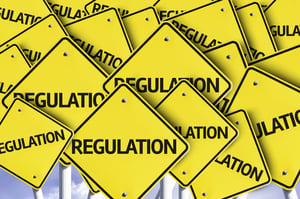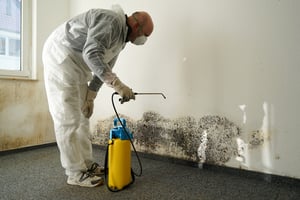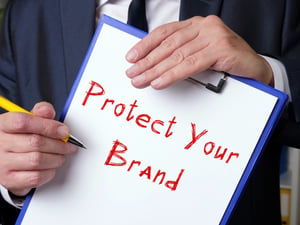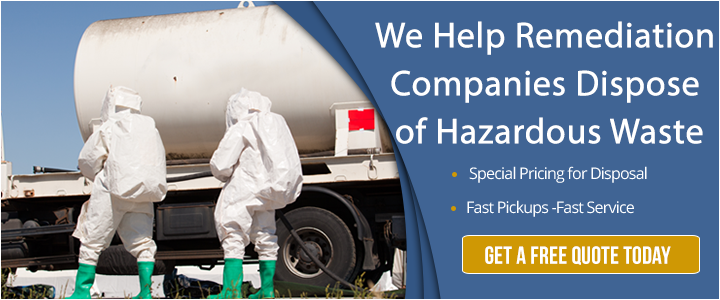Remediation companies often perform the dirty work. Whether it’s mold removal, soil clean up, water damage monitoring or other types of contamination removal, remediation services may be something you’d likely see on the show, “Dirty Jobs.”
Although this type of work might jokingly fall under the “somebody’s gotta do it” category, remediation services play a critical role in addressing contaminated sites and restoring them. This type of work is also extremely important because exposure to any of these environmental hazards can put those who live and work there at risk for developing harmful health conditions.
Once the remediation work is completed, however, the job is not done. Any chemicals and materials used during the remediation process must be properly disposed of according to local, state and federal laws. This becomes particularly important if this waste is considered hazardous.
Here are four reasons why remediation services should include waste disposal services, along with what you should look for when partnering with a waste disposal company.
- Hazardous waste disposal is heavily regulated
- Regulations are evolving
- Remediation Projects Can Be Massive In Size
- Your Reputation Is At Stake
Hazardous Waste Disposal Is Heavily Regulated
 Hazardous waste removal and disposal is heavily regulated in California. Any hazardous materials removed from a property, leftover chemicals or materials that have come in contact with hazardous properties should be properly disposed of. Not doing so can impact the air, soil, water and wildlife health … and lead to costly violations.
Hazardous waste removal and disposal is heavily regulated in California. Any hazardous materials removed from a property, leftover chemicals or materials that have come in contact with hazardous properties should be properly disposed of. Not doing so can impact the air, soil, water and wildlife health … and lead to costly violations.
Many companies have faced serious fines after improper disposal charges were levied against them by the California Department of Toxic Substances Control and other federal agencies.
One of the most recent cases involves national chain Walgreens, which had to pay the city of Los Angeles and 44 other jurisdictions a $3.5 million settlement for improperly disposing of its waste and other charges.
As a remediation company, you are helping other companies protect the environment and the public by taking the needed steps to remediate a problem. But proper disposal of any hazardous items is important in continuing the work of the remediation process and ensuring all laws are followed.
If proper disposal doesn’t occur, you may find yourself (and your client may find itself) in trouble with the law, similar to the trouble Lowe’s recently found itself in after being fined $181 million by the DTSC.
Regulations Are Always Changing
Environmental regulations are continually changing at both the state and federal levels. In California, there were nearly a dozen regulations considered during the 2019-2020 session, according to the Environmental Working Group.
 What was once not considered hazardous may now fall under the same strict disposal laws as other types of hazardous waste. At the end of 2020, for example, California added treated wood to the hazardous waste list. If your company performs black mold removal or must clean up after water damage, this law may be of interest to you if you remove treated wood from a property.
What was once not considered hazardous may now fall under the same strict disposal laws as other types of hazardous waste. At the end of 2020, for example, California added treated wood to the hazardous waste list. If your company performs black mold removal or must clean up after water damage, this law may be of interest to you if you remove treated wood from a property.
Keep in mind that even though a certain chemical or material may not be considered hazardous waste at the federal level, California has some of the most strict environmental laws on the books.
Working with an experienced waste disposal service that keeps track of changing legislation can help ensure your remediation business is compliant and up to date on any regulations that may impact your procedures.
Remediation Projects Can Be Massive In Size
Remediation projects can vastly vary in size, from small residential projects to massive projects that extend across several sites.
When evaluating the extent of a contamination, there are several aspects you will have to take into account as a remediation  company, from the type of contamination to what has been impacted (structures, soil, groundwater). You’ll also have to develop potential strategies that meet guidelines and costs.
company, from the type of contamination to what has been impacted (structures, soil, groundwater). You’ll also have to develop potential strategies that meet guidelines and costs.
When determining cleanup strategies, developing a relationship with a waste disposal service ahead of time can save you a lot of time on the back end and ensure there are no hold ups once remediation services have been completed.
The best waste disposal companies will have experience in the type of hazardous waste you will be disposing of. They will also be able to perform other services that can assist you during or after the remediation process, including packaging of the waste, labeling and manifesting, and even sampling of unknown wastes.
Once the waste is ready for transportation, a waste disposal company will transfer the waste to the appropriate facility, allowing you to focus on the remediation process itself.
Your Reputation Is At Stake
Resource Conservation and Recovery Act (RCRA) is a comprehensive piece of environmental law on the books today. As part of this legislation, anyone who generates hazardous waste is responsible for it from cradle to grave…meaning from the  moment it is generated to the moment it is properly disposed of.
moment it is generated to the moment it is properly disposed of.
As a remediation service, you want your clients to rest assured that any waste that is generated will be properly taken care of and that all laws are being followed. Yet many companies fail to realize their “complete” cradle to grave requirements include its transportation and its final safe disposal.
If the hazardous waste that is generated during remediation services is not properly disposed of, you and possibly your client will be held responsible for its improper transportation and disposal. The last thing you want to hear is that an employee you entrusted the waste with dumped it into a trash can or on the side of the road, or that a company you contracted with because it was the cheapest bid took the waste from the job site and dumped it at the local landfill.
Improper disposal could be devastating for the reputation of your company … and your client’s company. Partnering with an experienced, licensed hazardous waste disposal company is necessary in order to ensure all regulations are met … and your reputation stays intact.
What To Look For In A Waste Disposal Partner
If your remediation company is evaluating which waste disposal company would best help you deliver your services and work to keep the client’s needs a priority, here are a few tips on what to look for in a partner.
Hazardous waste companies should:
- Be licensed and bonded
- Have adequate insurance to ensure your company is protected to the fullest
- Be properly permitted for the transportation, storage, treatment and disposal of waste identified
- Have demonstrated a good sound history of regulatory compliance
- Have adequate personnel that are properly trained in handling the type of materials you will be removing from a property
- Be able to provide a statement of qualifications (SOQ)
- Identify which companies are utilized and for what activities if using subcontractors
- Be able to provide a list of references on past projects similar to the environmental remediation services your company is providing
Partnering with a licensed, experienced waste disposal company that has earned a top reputation in the industry will help to ensure your commitment to your client and to keeping the community safe stays intact even after all remediation services are completed.


Comment